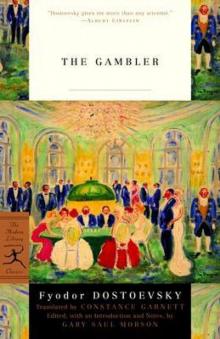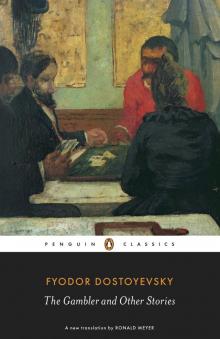- Home
- Fyodor Dostoyevsky
Poor Folk Anthology Page 2
Poor Folk Anthology Read online
Page 2
Why do you write thus about "comfort" and "peace" and the rest? I am not a fastidious man, nor one who requires much. Never in my life have I been so comfortable as now. Why, then, should I complain in my old age? I have enough to eat, I am well dressed and booted. Also, I have my diversions. You see, I am not of noble blood. My father himself was not a gentleman; he and his family had to live even more plainly than I do. Nor am I a milksop. Nevertheless, to speak frankly, I do not like my present abode so much as I used to like my old one. Somehow the latter seemed more cosy, dearest. Of course, this room is a good one enough; in fact, in SOME respects it is the more cheerful and interesting of the two. I have nothing to say against it—no. Yet I miss the room that used to be so familiar to me. Old lodgers like myself soon grow as attached to our chattels as to a kinsman. My old room was such a snug little place! True, its walls resembled those of any other room—I am not speaking of that; the point is that the recollection of them seems to haunt my mind with sadness. Curious that recollections should be so mournful! Even what in that room used to vex me and inconvenience me now looms in a purified light, and figures in my imagination as a thing to be desired. We used to live there so quietly—I and an old landlady who is now dead. How my heart aches to remember her, for she was a good woman, and never overcharged for her rooms. Her whole time was spent in making patchwork quilts with knitting-needles that were an arshin [An ell.] long. Oftentimes we shared the same candle and board. Also she had a granddaughter, Masha—a girl who was then a mere baby, but must now be a girl of thirteen. This little piece of mischief, how she used to make us laugh the day long! We lived together, a happy family of three. Often of a long winter's evening we would first have tea at the big round table, and then betake ourselves to our work; the while that, to amuse the child and to keep her out of mischief, the old lady would set herself to tell stories. What stories they were!—though stories less suitable for a child than for a grown-up, educated person. My word! Why, I myself have sat listening to them, as I smoked my pipe, until I have forgotten about work altogether. And then, as the story grew grimmer, the little child, our little bag of mischief, would grow thoughtful in proportion, and clasp her rosy cheeks in her tiny hands, and, hiding her face, press closer to the old landlady. Ah, how I loved to see her at those moments! As one gazed at her one would fail to notice how the candle was flickering, or how the storm was swishing the snow about the courtyard. Yes, that was a goodly life, my Barbara, and we lived it for nearly twenty years… . How my tongue does carry me away! Maybe the subject does not interest you, and I myself find it a not over-easy subject to recall—especially at the present time.
Darkness is falling, and Theresa is busying herself with something or another. My head and my back are aching, and even my thoughts seem to be in pain, so strangely do they occur. Yes, my heart is sad today, Barbara… . What is it you have written to me? —"Why do you not come in PERSON to see me?" Dear one, what would people say? I should have but to cross the courtyard for people to begin noticing us, and asking themselves questions. Gossip and scandal would arise, and there would be read into the affair quite another meaning than the real one. No, little angel, it were better that I should see you tomorrow at Vespers. That will be the better plan, and less hurtful to us both. Nor must you chide me, beloved, because I have written you a letter like this (reading it through, I see it to be all odds and ends); for I am an old man now, dear Barbara, and an uneducated one. Little learning had I in my youth, and things refuse to fix themselves in my brain when I try to learn them anew. No, I am not skilled in letter-writing, Barbara, and, without being told so, or any one laughing at me for it, I know that, whenever I try to describe anything with more than ordinary distinctness, I fall into the mistake of talking sheer rubbish… . I saw you at your window today—yes, I saw you as you were drawing down the blind! Good-bye, goodbye, little Barbara, and may God keep you! Good-bye, my own Barbara Alexievna!—Your sincere friend,
MAKAR DIEVUSHKIN.
P.S.—Do not think that I could write to you in a satirical vein, for I am too old to show my teeth to no purpose, and people would laugh at me, and quote our Russian proverb: "Who diggeth a pit for another one, the same shall fall into it himself."
April 9th
MY DEAREST MAKAR ALEXIEVITCH,—Are not you, my friend and benefactor, just a little ashamed to repine and give way to such despondency? And surely you are not offended with me? Ah! Though often thoughtless in my speech, I never should have imagined that you would take my words as a jest at your expense. Rest assured that NEVER should I make sport of your years or of your character. Only my own levity is at fault; still more, the fact that I am so weary of life.
What will such a feeling not engender? To tell you the truth, I had supposed that YOU were jesting in your letter; wherefore, my heart was feeling heavy at the thought that you could feel so displeased with me. Kind comrade and helper, you will be doing me an injustice if for a single moment you ever suspect that I am lacking in feeling or in gratitude towards you. My heart, believe me, is able to appraise at its true worth all that you have done for me by protecting me from my enemies, and from hatred and persecution. Never shall I cease to pray to God for you; and, should my prayers ever reach Him and be received of Heaven, then assuredly fortune will smile upon you!
Today I am not well. By turns I shiver and flush with heat, and Thedora is greatly disturbed about me… . Do not scruple to come and see me, Makar Alexievitch. How can it concern other people what you do? You and I are well enough acquainted with each other, and one's own affairs are one's own affairs. Goodbye, Makar Alexievitch, for I have come to the end of all I had to say, and am feeling too unwell to write more. Again I beg of you not to be angry with me, but to rest assured of my constant respect and attachment.—Your humble, devoted servant,
BARBARA DOBROSELOVA.
April 12th
DEAREST MISTRESS BARBARA ALEXIEVNA,—I pray you, my beloved, to tell me what ails you. Every one of your letters fills me with alarm. On the other hand, in every letter I urge you to be more careful of yourself, and to wrap up yourself warmly, and to avoid going out in bad weather, and to be in all things prudent. Yet you go and disobey me! Ah, little angel, you are a perfect child! I know well that you are as weak as a blade of grass, and that, no matter what wind blows upon you, you are ready to fade. But you must be careful of yourself, dearest; you MUST look after yourself better; you MUST avoid all risks, lest you plunge your friends into desolation and despair.
Dearest, you also express a wish to learn the details of my daily life and surroundings. That wish I hasten to satisfy. Let me begin at the beginning, since, by doing so, I shall explain things more systematically. In the first place, on entering this house, one passes into a very bare hall, and thence along a passage to a mean staircase. The reception room, however, is bright, clean, and spacious, and is lined with redwood and metal- work. But the scullery you would not care to see; it is greasy, dirty, and odoriferous, while the stairs are in rags, and the walls so covered with filth that the hand sticks fast wherever it touches them. Also, on each landing there is a medley of boxes, chairs, and dilapidated wardrobes; while the windows have had most of their panes shattered, and everywhere stand washtubs filled with dirt, litter, eggshells, and fish-bladders. The smell is abominable. In short, the house is not a nice one.
As to the disposition of the rooms, I have described it to you already. True, they are convenient enough, yet every one of them has an ATMOSPHERE. I do not mean that they smell badly so much as that each of them seems to contain something which gives forth a rank, sickly-sweet odour. At first the impression is an unpleasant one, but a couple of minutes will suffice to dissipate it, for the reason that EVERYTHING here smells—people's clothes, hands, and everything else—and one grows accustomed to the rankness. Canaries, however, soon die in this house. A naval officer here has just bought his fifth. Birds cannot live long in such an air. Every morning, when fish or beef is being cooked, and washing and scrub
bing are in progress, the house is filled with steam. Always, too, the kitchen is full of linen hanging out to dry; and since my room adjoins that apartment, the smell from the clothes causes me not a little annoyance. However, one can grow used to anything.
From earliest dawn the house is astir as its inmates rise, walk about, and stamp their feet. That is to say, everyone who has to go to work then gets out of bed. First of all, tea is partaken of. Most of the tea-urns belong to the landlady; and since there are not very many of them, we have to wait our turn. Anyone who fails to do so will find his teapot emptied and put away. On the first occasion, that was what happened to myself. Well, is there anything else to tell you? Already I have made the acquaintance of the company here. The naval officer took the initiative in calling upon me, and his frankness was such that he told me all about his father, his mother, his sister (who is married to a lawyer of Tula), and the town of Kronstadt. Also, he promised me his patronage, and asked me to come and take tea with him. I kept the appointment in a room where card-playing is continually in progress; and, after tea had been drunk, efforts were made to induce me to gamble. Whether or not my refusal seemed to the company ridiculous I cannot say, but at all events my companions played the whole evening, and were playing when I left. The dust and smoke in the room made my eyes ache. I declined, as I say, to play cards, and was, therefore, requested to discourse on philosophy, after which no one spoke to me at all—a result which I did not regret. In fact, I have no intention of going there again, since every one is for gambling, and for nothing but gambling. Even the literary tchinovnik gives such parties in his room—though, in his case, everything is done delicately and with a certain refinement, so that the thing has something of a retiring and innocent air.
In passing, I may tell you that our landlady is NOT a nice woman. In fact, she is a regular beldame. You have seen her once, so what do you think of her? She is as lanky as a plucked chicken in consumption, and, with Phaldoni (her servant), constitutes the entire staff of the establishment. Whether or not Phaldoni has any other name I do not know, but at least he answers to this one, and every one calls him by it. A red-haired, swine-jowled, snub-nosed, crooked lout, he is for ever wrangling with Theresa, until the pair nearly come to blows. In short, life is not overly pleasant in this place. Never at any time is the household wholly at rest, for always there are people sitting up to play cards. Sometimes, too, certain things are done of which it would be shameful for me to speak. In particular, hardened though I am, it astonishes me that men WITH FAMILIES should care to live in this Sodom. For example, there is a family of poor folk who have rented from the landlady a room which does not adjoin the other rooms, but is set apart in a corner by itself. Yet what quiet people they are! Not a sound is to be heard from them. The father—he is called Gorshkov—is a little grey-headed tchinovnik who, seven years ago, was dismissed from public service, and now walks about in a coat so dirty and ragged that it hurts one to see it. Indeed it is a worse coat even than mine! Also, he is so thin and frail (at times I meet him in the corridor) that his knees quake under him, his hands and head are tremulous with some disease (God only knows what!), and he so fears and distrusts everybody that he always walks alone. Reserved though I myself am, he is even worse. As for his family, it consists of a wife and three children. The eldest of the latter—a boy—is as frail as his father, while the mother—a woman who, formerly, must have been good looking, and still has a striking aspect in spite of her pallor—goes about in the sorriest of rags. Also I have heard that they are in debt to our landlady, as well as that she is not overly kind to them. Moreover, I have heard that Gorshkov lost his post through some unpleasantness or other—through a legal suit or process of which I could not exactly tell you the nature. Yes, they certainly are poor—Oh, my God, how poor! At the same time, never a sound comes from their room. It is as though not a soul were living in it. Never does one hear even the children— which is an unusual thing, seeing that children are ever ready to sport and play, and if they fail to do so it is a bad sign. One evening when I chanced to be passing the door of their room, and all was quiet in the house, I heard through the door a sob, and then a whisper, and then another sob, as though somebody within were weeping, and with such subdued bitterness that it tore my heart to hear the sound. In fact, the thought of these poor people never left me all night, and quite prevented me from sleeping.
Well, good-bye, my little Barbara, my little friend beyond price. I have described to you everything to the best of my ability. All today you have been in my thoughts; all today my heart has been yearning for you. I happen to know, dearest one, that you lack a warm cloak. To me too, these St. Petersburg springs, with their winds and their snow showers, spell death. Good heavens, how the breezes bite one! Do not be angry, beloved, that I should write like this. Style I have not. Would that I had! I write just what wanders into my brain, in the hope that I may cheer you up a little. Of course, had I had a good education, things might have been different; but, as things were, I could not have one. Never did I learn even to do simple sums!—Your faithful and unchangeable friend,
MAKAR DIEVUSHKIN.
April 25th
MY DEAREST MAKAR ALEXIEVITCH,—Today I met my cousin Sasha. To see her going to wrack and ruin shocked me terribly. Moreover, it has reached me, through a side wind, that she has been making inquiry for me, and dogging my footsteps, under the pretext that she wishes to pardon me, to forget the past, and to renew our acquaintance. Well, among other things she told me that, whereas you are not a kinsman of mine, that she is my nearest relative; that you have no right whatever to enter into family relations with us; and that it is wrong and shameful for me to be living upon your earnings and charity. Also, she said that I must have forgotten all that she did for me, though thereby she saved both myself and my mother from starvation, and gave us food and drink; that for two and a half years we caused her great loss; and, above all things, that she excused us what we owed her. Even my poor mother she did not spare. Would that she, my dead parent, could know how I am being treated! But God knows all about it… . Also, Anna declared that it was solely through my own fault that my fortunes declined after she had bettered them; that she is in no way responsible for what then happened; and that I have but myself to blame for having been either unable or unwilling to defend my honour. Great God! WHO, then, has been at fault? According to Anna, Hospodin [Mr.] Bwikov was only right when he declined to marry a woman who— But need I say it? It is cruel to hear such lies as hers. What is to become of me I do not know. I tremble and sob and weep. Indeed, even to write this letter has cost me two hours. At least it might have been thought that Anna would have confessed HER share in the past. Yet see what she says! … For the love of God do not be anxious about me, my friend, my only benefactor. Thedora is over apt to exaggerate matters. I am not REALLY ill. I have merely caught a little cold. I caught it last night while I was walking to Bolkovo, to hear Mass sung for my mother. Ah, mother, my poor mother! Could you but rise from the grave and learn what is being done to your daughter!
B. D.
May 20th
MY DEAREST LITTLE BARBARA,—I am sending you a few grapes, which are good for a convalescent person, and strongly recommended by doctors for the allayment of fever. Also, you were saying the other day that you would like some roses; wherefore, I now send you a bunch. Are you at all able to eat, my darling?—for that is the chief point which ought to be seen to. Let us thank God that the past and all its unhappiness are gone! Yes, let us give thanks to Heaven for that much! As for books, I cannot get hold of any, except for a book which, written in excellent style, is, I believe, to be had here. At all events, people keep praising it very much, and I have begged the loan of it for myself. Should you too like to read it? In this respect, indeed, I feel nervous, for the reason that it is so difficult to divine what your taste in books may be, despite my knowledge of your character. Probably you would like poetry—the poetry of sentiment and of love making? Well, I will send you a
book of MY OWN poems. Already I have copied out part of the manuscript.
Everything with me is going well; so pray do not be anxious on my account, beloved. What Thedora told you about me was sheer rubbish. Tell her from me that she has not been speaking the truth. Yes, do not fail to give this mischief-maker my message. It is not the case that I have gone and sold a new uniform. Why should I do so, seeing that I have forty roubles of salary still to come to me? Do not be uneasy, my darling. Thedora is a vindictive woman—merely a vindictive woman. We shall yet see better days. Only do you get well, my angel—only do you get well, for the love of God, lest you grieve an old man. Also, who told you that I was looking thin? Slanders again—nothing but slanders! I am as healthy as could be, and have grown so fat that I am ashamed to be so sleek of paunch. Would that you were equally healthy! … Now goodbye, my angel. I kiss every one of your tiny fingers, and remain ever your constant friend,
MAKAR DIEVUSHKIN.
P.S.—But what is this, dearest one, that you have written to me? Why do you place me upon such a pedestal? Moreover, how could I come and visit you frequently? How, I repeat? Of course, I might avail myself of the cover of night; but, alas! the season of the year is what it is, and includes no night time to speak of. In fact, although, throughout your illness and delirium, I scarcely left your side for a moment, I cannot think how I contrived to do the many things that I did. Later, I ceased to visit you at all, for the reason that people were beginning to notice things, and to ask me questions. Yet, even so, a scandal has arisen. Theresa I trust thoroughly, for she is not a talkative woman; but consider how it will be when the truth comes out in its entirety! What THEN will folk not say and think? Nevertheless, be of good cheer, my beloved, and regain your health. When you have done so we will contrive to arrange a rendezvous out of doors.

 The Eternal Husband
The Eternal Husband Crime and Punishment
Crime and Punishment The Brothers Karamazov
The Brothers Karamazov Notes From Underground
Notes From Underground The Idiot
The Idiot Netochka Nezvanova (Penguin ed.)
Netochka Nezvanova (Penguin ed.) The Gambler
The Gambler The Double
The Double Poor Folk Anthology
Poor Folk Anthology The Gambler and Other Stories (Penguin ed.)
The Gambler and Other Stories (Penguin ed.) Prestuplenie i nakazanie. English
Prestuplenie i nakazanie. English Notes from the Underground
Notes from the Underground The Double: A Petersburg Poem
The Double: A Petersburg Poem White Nights and Other Stories / The Novels of Fyodor Dostoevsky, Volume X
White Nights and Other Stories / The Novels of Fyodor Dostoevsky, Volume X Complete Works of Fyodor Dostoyevsky
Complete Works of Fyodor Dostoyevsky Poor Folk and Other Stories
Poor Folk and Other Stories The House of the Dead
The House of the Dead